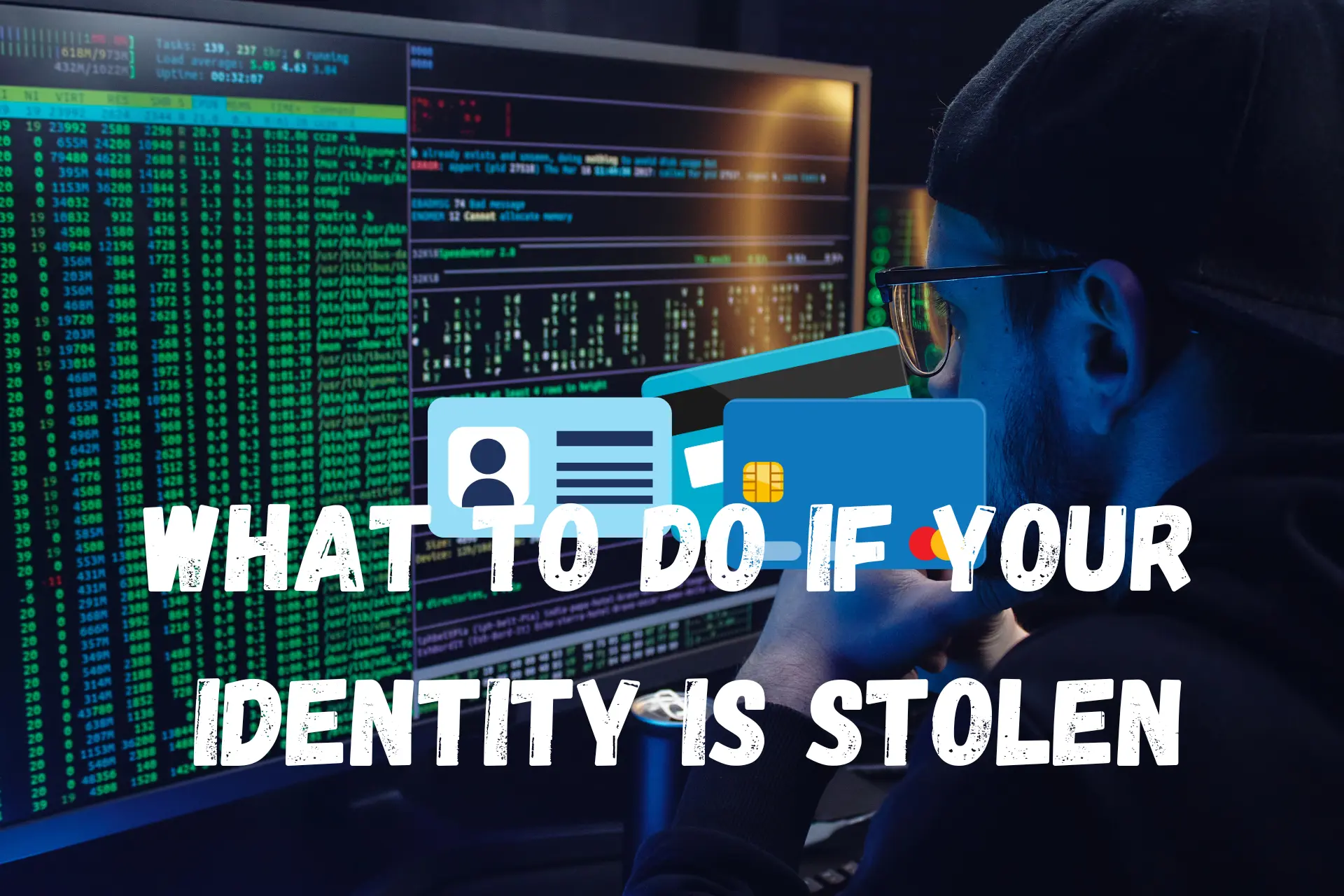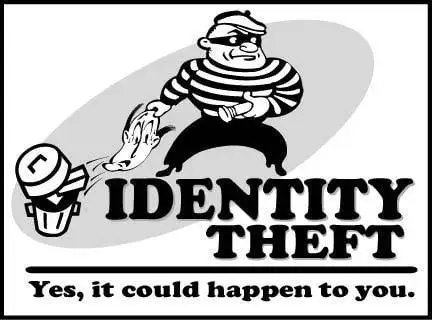Identity Theft - What is it and How to Stay Safe?
22 min. read
Updated on
Read our disclosure page to find out how can you help VPNCentral sustain the editorial team Read more

People have become good at using whatever they can find to get the best out of it.
It’s enough for one or two pieces of sensitive info to slip through the cracks of your security. The next thing you know, someone emptied your bank account, or you start discovering prescriptions on someone else’s medical record.
Using your data to impersonate you is called identity theft.
It’s one of the most common uses for the data that a hacker collects about you. It’s also one of the worst experiences that many people had to go through.
Obviously, it’s illegal, and doing so might result in different punishments, depending on the country where you’re doing it.
So, if you start noticing that someone’s impersonating you, what should you do? What are the best identity theft protection measures you can adopt?
Well, that also depends on where you’re from. Today, however, we’re going to cover how can you stop something like that in:
- United States
- United Kingdom
- Australia
- Canada
How can someone steal your identity
What is important to mention now is how can they occur.
Well, as we mentioned previously, in order for someone to steal your identity, they need information. And that mostly includes private information.
In this day and age, pretty much everything about you is accessible through a computer.
Because of this, a lot of privacy breaches can result in information theft, which can then lead to identity theft.
The two often go together, and the thief can target personal data like login credentials, credit card numbers, social security numbers, and alike.
Because of this, it is important not to share any additional info online if you can avoid it in any way. Most people don’t realize this, and they are often too casual with their data.
Sometimes, a thief won’t just bust in, collect the data and run away to study it in the same place. Instead, they will spend a lot of time observing the victim and learning about them.
They will create a profile, learn the way the person thinks, find out what they like, who they spend time with, and other personal info.
With all that in their possession, they might even guess your password and similar details.
Another method includes malicious software that you can download and install by accident. Hackers can leave it on a random, relatively busy website and wait for someone to pick it up.
Most of the time, however, they will have a targeted audience that they will try to trick via email. This is called a phishing attack.
Basically, a hacker will pretend to be someone you will trust, like a bank or similar service. They will then include a link, or photo, document, or another type of attachment in the email.
When you open it, the malware will quietly sneak onto your device, activate itself, establish the connection to the hacker, and start feeding them data.
Most of this will happen as a background process, so the victim won’t even know that something is going on.
Then, there is using old computers and phones that you may have thrown away and extracting data from them.
Other methods include stealing documents, shoulder-surfing, which means that someone is peeking while you are entering credentials, and even buying your stolen credentials on the dark web.
There are even more ways, but these are the main ones that you must watch out for the most.
Identity theft protection – how to protect your identity from getting stolen
Knowing what to do in case of identity theft is good, but preventing one is much better.
Identity thefts are possible because of the information theft. Basically, nobody can steal your identity if they don’t know things about you.
With that in mind, you need to find a way to prevent them from getting to that info.
This includes the protection of all of your devices that have any sort of data on them:
- desktops
- laptops
- smartphones
- tablets
- smartwatches
You need to protect all of those devices.
You can do that in several ways.
→For example, take a good, long background check for every app that you download.
You never know whether or not it might start spying on you.
→ Also, don’t forget to update your software on a regular basis.
This is especially important for antivirus and antimalware software.
→ And lastly, get a VPN as an enhanced identity theft protection.
VPNs are masters of protection.
They can encrypt your data, protect it with a secure tunnel, and even assign it to another IP address so that nobody can trace it back to you.
With a VPN, you’ll know that your data is as safe as possible.
Also, it offers apps for pretty much all of the devices.
You can even get a special VPN router so that every device connected to your network will use the web without danger.
For those new to the VPN concept, we recommend trying out ExpressVPN, IPVanish, CyberGhost, or NordVPN.
Now let’s see what you can do once you realize someone stole your identity.
There are different laws and agencies that take care of this, depending on the country, so we’ll take each one by one.
What to do if your identity is stolen in the US?
Identity theft’s number one cause is money.
The thief will try to get your credit card number and they’ll use as much of your money as they can for their own purposes.
1. Raise a fraud alert
The main thing for you to do here is to raise a fraud alert.
You should place it on your credit reports and make sure that everyone related to the problem is aware of what’s going on.
That includes contacting the national credit bureaus. There are three of them, and those are:
It’s enough for you to inform one of them of the fact that someone is impersonating you. It’s their duty, by the law, to contact and inform the rest of them too.
The sooner you raise the fraud alert, the less damage the potential thief can cause to you.
They might try opening new accounts in your name. The alert will prevent them from doing that, thanks to the quick information sharing.
In case someone tries to open a new account in your name, the businesses will see that the alert is raised.
They’ll have to contact you and try to verify if it’s really you who’s opening the account, or if it’s the imposter.
Once raised, this original fraud alert will last around 90 days.
A credit freeze is also a good idea in case of an identity theft.
It might cost you a bit, but nothing too much. Expect the cost of doing so to be around $10, but it largely depends on your state. This is one of the more extreme measures for you to take.
Doing so will block anyone from accessing your credit file, including the creditors, or the companies that you’re subscribed to.
This is a bit problematic side effect, but it’s the best solution for stopping anyone from spending your money.
2. Order the credit reports
The next thing you’d want to do is order your credit reports.
It never hurts to be sure and to check what’s going on with your accounts.
And don’t worry, you have the right to request one report per year by law. Also, if you place a fraud alert, you get an additional report request.
In it, you’ll be able to see which accounts are opened and assigned to your name.
If you find something that you don’t recognize, you should contact the businesses in question. Explain the situation, and close the accounts.
Also, if you lose a large amount of your money, you might want to try and get a refund.
3. Make an identity theft report
And of course, the last of the most important actions for you to take is making an identity theft report.
This is very important because it will serve as proof that someone stole your identity. You can show it to businesses while you’re requesting the shutdown of “your” accounts.
It’s a good way to prove that someone is misusing your information.
That way you won’t be charged for fraud, and companies will also stop taking your money. An identity theft report will also come in handy if you need to extend the fraud alert, too.
Once your initial 90 days are up, the alert raises. If the situation isn’t handled by then, you’ll need to extend the alert. You should print out a copy of an affidavit after submitting your official complaint to the FTC.
Also, it’ll be good to file a police report and get a copy of one of those too.
You need an affidavit for that too. Once you get copies of these documents, you’ll finally be able to complete your theft report.
Depending on what the thief has done with your stolen data, the rest of the steps are probably different for everyone. The most important thing is to be aware of what has happened and to raise that awareness in others that have dealings with you.
Remember, clearing up this kind of situation and limiting the potential damage as much as possible is your top priority.
What to do if your identity is stolen in Canada?
Having your identity stolen is always a traumatic experience, and that goes for Canada too. You need to act fast and think what’s the worst thing that someone who has stolen your identity might do to you.
1. Cancel your cards
With that in mind, go and cancel all of your cards immediately.
That goes for financial and all the other cards as well. If you don’t, you’ll be to blame for every and any credit damage that you suffer.
Most of the time, you’ll be able to get new cards when you’re canceling the old ones.
Pretty much like in the case of identity theft in America, your next step would be informing Equifax and TransUnion of the situation.
The national credit reporting bureaus need to be informed of things like this, otherwise, they won’t be able to help.
2. Fraud alerts are necessary
Ask for placing fraud alerts, as well as for credit reports, so that you’d know what the imposter is up to.
What’s different in Canada, as opposed to America, is the fact that you must contact both bureaus yourself.
They won’t do it for you. On the other hand, your alert will last for about six years instead of three months.
Once all of that is done, inspect your credit reports, and cancel everything that the thief has opened in your name.
Simply explain the situation to all of the businesses, and cancel everything that you don’t want or recognize.
This is what needs to be done urgently, otherwise, you might get in trouble that will take you years to sort out.
That’s why you need to do it all as quickly as possible. And after that, contact the police, and file a report.
A report number or a report copy is something that you’ll need in the future, so make sure to get one of those.
You might have to use them as proof that your identity was stolen.
When you finish with all of that, you’re back on the phone.
At this point, you should contact Canadian Anti-fraud Centre. The center, called CAFC, for short, is collecting all of the info about criminals involved in fraud, and they can help you as much as you can help them.

Their website has an Identity Theft Statement for you to fill out. With it, you can notify the creditors and explain the situation much easier.
They’ll need to start their own investigations about fake debts and charges, and they need to know as soon as possible.
Copies of such reports need to get to as many creditors and companies as possible. Everyone affected by identity theft needs to familiarize themselves with the situation in order to deal with it.
You need to review, check and control all of your banking reports and credit card statements. Also, make sure that your mail isn’t redirected.
If you think that there’s the slightest possibility of that, contact Canada Post immediately.
And don’t forget to notify your utility providers as well. Everyone who’s connected with you and does any sort of business with you must know of this. This includes the providers of water, phone, gas, electricity, and anything else.
What to do if your identity is stolen in the UK?
A similar procedure also goes for those who believe that they are victims of identity theft in the UK.
Start by requesting credit reports, and check for unknown expenses. You can get one from any of the UK’s national credit bureaus:
Explain the situation and your suspicions, and then search and point out any of the unknown accounts.
Try to shut them down immediately so that the damage would be minimal. In order to access your credit reports in bureaus, you’ll need to sign up and get a free trial account.
That’ll cost you around £2.00.
Your next stop is the bank, where you’ll check your credit card activity.
If you notice anything out of the ordinary, alert the bank right away, and cancel your credit cards, or at least replace them.
Once you take care of it, you’re free to contact the police. You must file a report as soon as you finish securing your bank account and notifying your credit bureau.
And once again, don’t forget to take a copy of a report or at least its number with you. It’s the proof of your story and you’ll likely need it to revoke some of the fake accounts and orders.
With reports about your credit cards, as well as the ones you got from the police, start restoring your identity. Explain the situation to everyone involved, close accounts, cancel orders, and erase debts.
Be quick about it, because time is of the essence.
Especially today, with such fast services. Keep notes of what you do, who you speak to, and other things like that. It might help to avoid confusion and have proof of your actions.
Also, don’t forget to check in with your post office, since your mail can easily start going elsewhere.
And if you wish, you can always apply to CIFAS. This is the fraud prevention service in the UK, and it’s similar to those from Canada or the US.
What to do if your identity is stolen in Australia?
If you’re an Australian and you believe that you have a problem with identity theft, go to the police and report the issue.
Ask for a copy of a report so that you could deal with the potential consequences of the theft as well. Also, proceed to report your situation to the Australia Cyber Crime Online Reporting Network.
There’s also a national identity support service called IDCARE. You can send a support request to them as well.
They also support New Zealand, as well as Australia. Any further advice that you might need on how to deal with the situation can come from them.
Other than that, you can contact banks, credit card companies, government agencies, insurance firms, etc.
If they might be affected, you owe them a call. Replace any card and close every unknown account. Revoke all of the unknown purchases, and cancel any pending deliveries.
You can find data about most of these things in your copy of your credit report. You can get one from the credit reporting agencies such as:
- Tasmanian Collection Service
- Dun and Bradstreet
- Veda Advantage
Request placing a fraud alert in each of these agencies, so that the word would be spread as quickly as possible.
Contact different businesses that the thief might have been at and explain the situation. Also, make sure that your address is still the same.
A victim’s certificate is also something that you can get, but it’s not necessary if you have a police report.
Types of identity theft
Identity thefts are divided into several different categories. Those include:
- Identity cloning
- Criminal identity theft
- Synthetic identity theft
- Medical identity theft
- Financial identity theft
- Child identity theft
Identity cloning
This is a type of identity theft that mostly doesn’t have financial gain as its goal, but rather an impersonation of someone else for hiding your own identity. Most of the time, this is the method that illegal immigrants use when they enter another country.
There is an entire process where someone’s identity is then stolen and false documents are given to the immigrant.
He or she can then start a new life but with someone else’s name.
Another subtype of identity cloning that you can often see online is called posing.
Posers are those who use social networks to create fake accounts and pretend to be someone else.
Most of the time, they will create believable stories that will even involve friends of their victim. And if they happen to get the personal info or credentials of their victim, the faking may last for years.
Criminal identity theft
This often happens when a criminal falsely identifies himself after being arrested by the police.
They might have stolen an ID that the owner did not report, or perhaps they simply use a pretty realistic fake ID.
Either way, by using this method, they can often get away, while the victim of the identity theft gets the blame.
They can only discover that their identity was stolen after receiving fines, court summons, or finding out that their driver’s license is under suspension.
Either way, sorting things out is often very difficult, and sometimes even impossible. It is especially bad if there is major damage that you need to pay for. The damaged party doesn’t care if you are guilty or not, they want their money.
Synthetic identity theft
This is a newer type of identity theft that combines real and fake info. Basically, the criminal will steal the name and birth date of one person, and combine them with the social security number of someone else.
This is also very hard to detect, because of this combination of data. The traces of the criminal’s activities will end up divided between two individuals whom they stole from. To make matters worse, these are always complete strangers who don’t know of each other’s existence and much less of their situation.
In these cases, those who suffer the most are those who criminal manages to trick.
And, of course, the victims of the identity theft themselves, since those are their names and information that will be connected with the crimes.
Medical identity theft
It is one of the most life-threatening forms of identity theft.
It starts with someone stealing your identity and maybe even an insurance card. They will then pose as you in order to get free medical treatment.
Apart from having financial consequences, it can also result in adding the wrong information to the victim’s medical record.
Because of this, doctors may deliver inappropriate medical care. That is what makes this so dangerous, especially since such false data is very difficult to correct or even notice.
Financial identity theft
This is the type of identity theft most commonly met in a practical situation.
It needs no special introduction since it is fairly simple and obvious what its point is. Basically, someone wants to steal another person’s identity in order to rob them of their money.
When they obtain enough info about the victim, identity thieves might get loans, credits, services, or goods. They might only collect the goods and send the bill to the victim. Alternatively, they might get a loan and pay for the goods, but then the victim has to pay back the original loan.
Either way, a lot of money can get lost, and someone will have to take the blame. More often than not, that someone will be the victim.
Child Identity Theft
Children are often a target for identity thieves because of their social security numbers.
With a child’s identity, thieves can buy entire houses, establish lines of credit, and make similar frauds. If you were wondering how long can the effects of identity theft last, you won’t like the answer.
This can last for years or even decades until the child grows up and tries doing something similar.
This is a growing problem that is very common, and it is very hard to deal with. The thief is often someone in the family who wishes to commit fraud, but sometimes, it is a family friend or even a complete stranger.
How to tell if someone is using your identity
In many of these cases, you won’t feel the consequences until it is already too late.
By that time, the damage is done, and the thief is long gone. Or worse, nearby, and waiting for things to calm down again.
However, there are often some small warnings and signs that not everything is as it should be, and this is what you need to watch out for.
For example, you might start receiving credit card charges, when you know that you did not buy any of the mentioned goods.
Maybe you will receive a call about some suspicious activity, something that doesn’t seem like your regular behavior.
Fraud control departments tend to watch out for things like that, and they might want to check in with you.
Sometimes you may even receive a new credit card, one that you did not even apply for. Next, you might notice that your money is often missing, or that you suddenly have less than you used to. Or you might notice that your regular mail is not arriving anymore.
Sometimes, you might get a court summons, or a fine in your mail. Weird bills that don’t apply to you, or for some services that you never use are also a sign that something is not correct.
Also, pay close attention to your yearly tax return, it might show that you are earning more than you actually do. This is another sign of identity theft that you have to deal with.
Keeping track of these activities is very important. You must always be aware of something like this, and watch out for these signs.
Now, since you are busy with your own responsibilities, you can always hire one of the specialized agencies to do it for you. There are many of them out there that you can trust with monitoring of your accounts.
For a small fee, these agencies will track your account’s activities, and try to discover any unusual occurrences.
Anything that might seem suspicious or out of character will be recorded and reported to you. I
f you are the one responsible for the activity, the agency will simply continue monitoring the account as if nothing has happened. However, if you are a victim of identity theft, you would like to know as soon as possible.
By using this method, you can ensure that you are never caught off-guard by the identity thieves.
It can mean a lot if you manage to discover such problems as soon as they happen. Otherwise, it might take weeks, or even months before you notice that something is wrong.
And, as usual, by the time you do find out that there is an issue, it is already too late to do anything.
These are the things that might ruin your life if you don’t pay attention to them, or hire someone else to do it for you.
Also, you can try and get your own credit reports from credit reporting agencies, also known as credit bureaus.
There are many of them, but the majority of the US citizens are most familiar with three of them. These are Equifax, Experian, and the TransUnion.
According to the law, you have the right to demand a free credit report from each of them every year.
You can exploit this right and regularly check your credit every four months, for example. You can do it more often, but it won’t stay free.
Also, if you ever notice that there is an issue with your report, you can contact one of them and alert them. They will then notify the other two as well so that you donât have to.
Instead, you can start contacting your banks and other institutions that should know about the problem. Here is the contact information for the three bureaus:
Experian – www.experian.com
- P.O. Box 2104
- Allen, TX 75013-0949
- 1-888-EXPERIAN (397-3742)
Equifax – www.equifax.com
- P.O. Box 740241
- Atlanta, GA 30374-0241
- 1-800-685-1111
TransUnion – www.transunion.com
- P.O. Box 1000
- Chester, PA 19022
- 1-800-916-8800
Now, according to the US surveys from 2015 and 2016, identity thefts felt a relatively noticeable increase.
For example, in 2015, the identity fraud damage was around $15.3 billion, and the number of victims was around 13.1 million.
However, only one year later, in 2016, the amount rose to $16 billion, and 15.4 million users fell victim.
However, it seems that complaints concerning identity theft have increased a lot more in 2015 than in 2014. According to statistics, this increase is about an astounding 47%.
Conclusion
Losing your identity can lead to a lot of problems. You can lose your home, money, and everything you own if someone manages to steal your name.
The best thing to do is to adopt any measure needed to prevent identity theft from happening.
The most enhanced identity theft protection is to always get online protected by one of the best VPN services.
Identity theft is a traumatic experience, and if anything like this ever happens to you, you must know what to do.
From the text, you can see that the most important thing to do is to contact the authorities. After that, there’s blocking of your cards and raising awareness that another you are making a mess.
By doing that as soon as possible, you reduce the chances of major damage and increase the chance of catching the thief. File as many reports as you can and ensure yourself.









User forum
0 messages